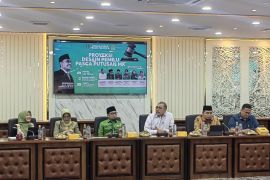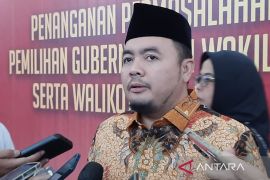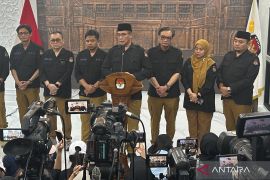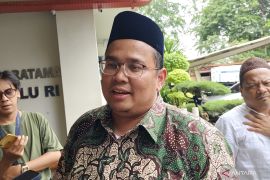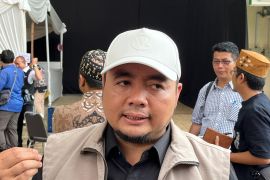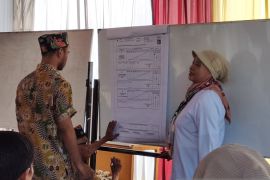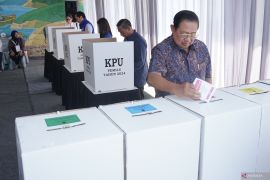It is a fact that more than 5.5 million workers in the trade sector were absorbed as traders in traditional markets."Jakarta (ANTARA News) - Considered a more effective place for the 2014 legislative election campaigns, traditional markets have become the target of political parties to win the hearts of people.
Unlike previous elections when the campaigns were staged at open fields, the political parties that will contests in the upcoming legislative elections have come to the traditional markets to campaign.
The parties, which have conducted the campaigns at the traditional markets, are among others, Great Indonesia Movement (Gerindra) Party, Democratic Party, and Indonesian Democratic Party of Struggle (PDI-P).
In Kudus district, Central Java, the legislative candidates from Democratic Party staged the campaign on Monday at Wergu traditional market along the Agus Salim street, to win the sympathy of the local traders.
"We intentionally conduct our campaign at this traditional market because here, we can meet a lot of people," explained Aminah, a woman legislative candidate from the Democratic Party, in Kudus on Monday.
Aminah noted that most of the traders at the traditional market are familiar with her because she frequently did her shopping there, and therefore, she opined that was an effective place for them to campaign.
Meanwhile, women legislative candidates from PDI-P also campaigned at some traditional markets in Gunung Kidul district, Yogyakarta, last Wednesday.
Ervianamurti Kurnisetyowati, a PDI-P woman legislative candidate, stated that campaigning at the traditional market was more effective than staging it at open fields.
"If we stage the campaigns at open fields, people are reluctant to come, but if we do it at the traditional markets, we get to meet a lot of people and find out what we can do for them later," Ervianamurti pointed out at the Argosari traditional market in Gunung Kidul.
In Bali province, the woman legislative candidates from Gerindra have expressed their determination to strive for the success of traditional markets on the paradise island of Bali.
"We will work to bring traditional markets at par with modern ones in our effort to improve economic activities on this island resort of Bali," Gerindra woman legislative candidate Desy Dwi Jayanti stated in Denpasar on Tuesday.
She noted that traditional markets have played bigger roles in economic sustainability because things there were not only similar in quality to those in the modern markets, but were cheaper.
Although things in traditional markets are cheaper, people prefer shopping in modern markets because they are cleaner and more comfortable.
"Therefore we will continue to fight for traditional markets, particularly in Denpasar, to make them as competitive and comfortable as modern markets are," she pointed out.
According to her, proper management of traditional markets to make the atmosphere there livelier will directly improve the welfare of the society, because populist economic sectors will gain a broader market access.
"The farmers and populist economic sector will only survive if they have broader market access. Therefore, the management and development of traditional markets should be made to improve peoples welfare," Desy Dwi Jayanti noted.
Meanwhile, another woman legislative candidate from Gerindra, Putu Paramitha Purnama Sari, also pointed out the importance of clean, orderly, and healthy traditional markets for the improvement of peoples economy.
She promised that if she gets elected as legislator in the upcoming legislative elections, she will fight to generate more funds to develop traditional markets and creative economy.
In recent years, traditional markets have been under pressure by newer forms of retailing, such as supermarkets, chain stores and convenience stores.
But the government continues to focus its attention on improving the traditional markets facilities and sanitation, as well as vendor services.
Modernization of traditional markets is necessary because it is believed to boost the economy and strengthen the competitiveness of traders with those in modern markets.
Therefore, government ministries are working to modernize traditional markets in a number of regions in 2014.
"One of our programs this year is to revitalize around 60 traditional markets and to build 88 locations for street vendors in a number of provinces," Cooperatives and Small and Medium Enterprises Minister Sjarifuddin Hasan stated here some time in February.
He noted that the program was the follow-up of a similar project carried out in 2013, when 254 locations for PKL were built and 472 traditional markets were managed by cooperatives.
"Modernization of traditional markets and good management of street vendors by cooperatives will help solve the problem of trading and providing double benefits to traders," he explained.
Sjarifuddin noted that the revitalization is expected to develop the domestic economy and increase regional revenues, because it was in line with the efforts of regional governments to improve the locations of street vendors.
According to Sjarifuddin, the presence of traditional markets and the management of PKL locations will improve the image of trading because of the permanent locations of business places and the creation of jobs.
"It is a fact that more than 5.5 million workers in the trade sector were absorbed as traders in traditional markets," the minister reiterated.
Besides the Cooperatives and Small and Medium Enterprises Ministry, in 2014 the Ministry of Trade will also revitalize some 79 traditional markets across the country.
"This year, a total of Rp556 billion will be allocated from the state budget to revitalize around 79 traditional markets across the country," the Trade Ministrys Director General for Domestic Trade, Srie Agustina, clarified here recently.
According to Srie, at least 40 percent of the funds will be spent on the revitalization of traditional markets in eastern Indonesian regions, including in North Sulawesi, South Sulawesi, Central Sulawesi, and Kalimantan.
Meanwhile, Deputy Trade Minister Bayu Krisnamurthi stated earlier that the Ministry of Trade has spent Rp1.9 trillion from the state budget on renovating traditional markets.
"Between 2011 and 2013, the Ministry of Trade revitalized 461 traditional markets to improve their image, which was often seen as dirty and disorganized," he explained.
According to Bayu, there are 9,559 traditional markets in Indonesia, but 95 percent of them are more than 25 years old and in need of renovation.
In Depok city, West Java, Suparyono, a member of the regional legislative council, has asked the city administration to pay attention to traditional market traders in order to improve their businesses.
"Traders in the traditional markets here will be unable to grow their businesses if they escape the attention of the city government," Suparyono stated.
He noted that most of the traders at the traditional markets in Depok were unable to manage their businesses because they could not compete with mushrooming modern market traders.
"They are less capable of managing their businesses, and therefore they need to undergo proper training in order to be able to compete with the traders in the modern market," added a politician from the Prosperous Justice Party (PKS).
Further, Suparyono expressed his hope that the Depok city government will restrict the presence of modern mini markets.
Traditional markets in various regions need to be revitalized by improving their buildings and management, in order to attract more customers and boost local economies.
(Uu.O001/INE/KR-BSR/A014)
Reporter: Otniel Tamindael
Editor: Priyambodo RH
Copyright © ANTARA 2014


